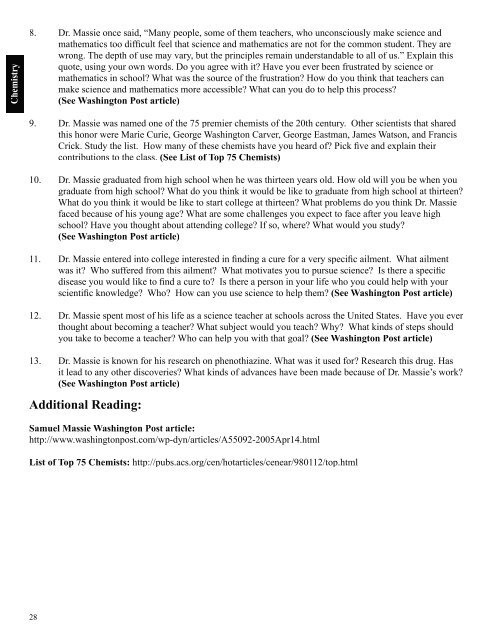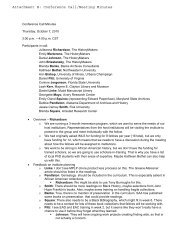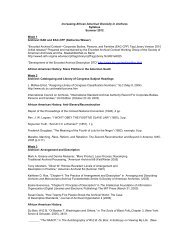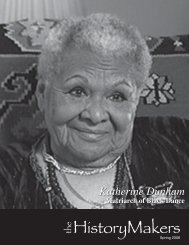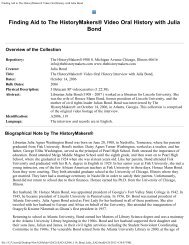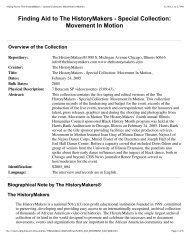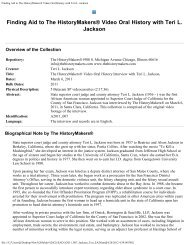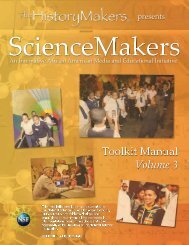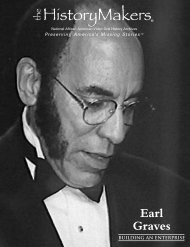ScienceMakers Toolkit Manual - The History Makers
ScienceMakers Toolkit Manual - The History Makers
ScienceMakers Toolkit Manual - The History Makers
You also want an ePaper? Increase the reach of your titles
YUMPU automatically turns print PDFs into web optimized ePapers that Google loves.
Chemistry<br />
8. Dr. Massie once said, “Many people, some of them teachers, who unconsciously make science and<br />
mathematics too diffi cult feel that science and mathematics are not for the common student. <strong>The</strong>y are<br />
wrong. <strong>The</strong> depth of use may vary, but the principles remain understandable to all of us.” Explain this<br />
quote, using your own words. Do you agree with it? Have you ever been frustrated by science or<br />
mathematics in school? What was the source of the frustration? How do you think that teachers can<br />
make science and mathematics more accessible? What can you do to help this process?<br />
(See Washington Post article)<br />
9. Dr. Massie was named one of the 75 premier chemists of the 20th century. Other scientists that shared<br />
this honor were Marie Curie, George Washington Carver, George Eastman, James Watson, and Francis<br />
Crick. Study the list. How many of these chemists have you heard of? Pick fi ve and explain their<br />
contributions to the class. (See List of Top 75 Chemists)<br />
10. Dr. Massie graduated from high school when he was thirteen years old. How old will you be when you<br />
graduate from high school? What do you think it would be like to graduate from high school at thirteen?<br />
What do you think it would be like to start college at thirteen? What problems do you think Dr. Massie<br />
faced because of his young age? What are some challenges you expect to face after you leave high<br />
school? Have you thought about attending college? If so, where? What would you study?<br />
(See Washington Post article)<br />
11. Dr. Massie entered into college interested in fi nding a cure for a very specifi c ailment. What ailment<br />
was it? Who suffered from this ailment? What motivates you to pursue science? Is there a specifi c<br />
disease you would like to fi nd a cure to? Is there a person in your life who you could help with your<br />
scientifi c knowledge? Who? How can you use science to help them? (See Washington Post article)<br />
12. Dr. Massie spent most of his life as a science teacher at schools across the United States. Have you ever<br />
thought about becoming a teacher? What subject would you teach? Why? What kinds of steps should<br />
you take to become a teacher? Who can help you with that goal? (See Washington Post article)<br />
13. Dr. Massie is known for his research on phenothiazine. What was it used for? Research this drug. Has<br />
it lead to any other discoveries? What kinds of advances have been made because of Dr. Massie’s work?<br />
(See Washington Post article)<br />
Additional Reading:<br />
Samuel Massie Washington Post article:<br />
http://www.washingtonpost.com/wp-dyn/articles/A55092-2005Apr14.html<br />
List of Top 75 Chemists: http://pubs.acs.org/cen/hotarticles/cenear/980112/top.html<br />
28


